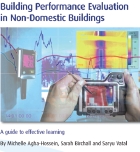Building performance evaluation

BSRIA has published an introduction to building-performance evaluation (BPE) for non-domestic buildings that explains why it is important and how it can be carried out. BPE is a key element of the BSRIA soft-landings process to help deliver a building that meets the performance as expected and deliver an effective and efficient building.
The guide focuses on new, existing and refurbished non-domestic buildings and aims to inform those involved in the design, construction, operation and/or management of a building about the current performance.
Catherine England, BSRIA marketing officer, said, ‘Despite genuine intentions to develop efficient buildings, the construction industry is still missing the mark. Recent research from academia and industry has shown that buildings do not always perform in the way that was originally intended. This results in inefficiencies in energy performance, and occupant dissatisfaction. BPE is the process of evaluating how a building performs and can be used on both new and existing buildings in order to address these issues. The publication captures this process.’
The guide discusses some of the tests and methods that can be included when reviewing building performance to provide information on the following.
• building fabric
• building services and operating strategies
• energy use
• handover and commissioning processes
• occupant satisfaction
• occupant comfort conditions







